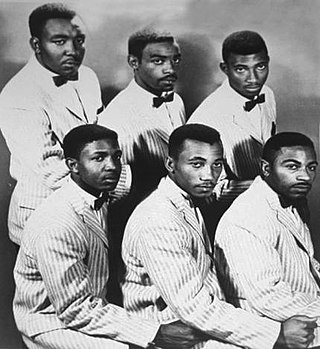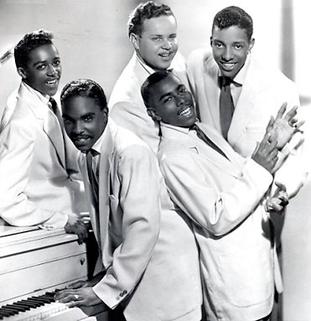Related Research Articles

Doo-wop is a genre of rhythm and blues music that originated in African-American communities during the 1940s, mainly in the large cities of the United States, including New York, Philadelphia, Pittsburgh, Chicago, Baltimore, Newark, Detroit, Washington, D.C., and Los Angeles. It features vocal group harmony that carries an engaging melodic line to a simple beat with little or no instrumentation. Lyrics are simple, usually about love, sung by a lead vocal over background vocals, and often featuring, in the bridge, a melodramatically heartfelt recitative addressed to the beloved. Harmonic singing of nonsense syllables is a common characteristic of these songs. Gaining popularity in the 1950s, doo-wop was "artistically and commercially viable" until the early 1960s, but continued to influence performers in other genres.

The Moonglows were an American R&B group in the 1950s. Their song "Sincerely" went to number 1 on the Billboard R&B chart and number 20 on the Billboard Juke Box chart.

The Flamingos are an American doo-wop group formed in Chicago in 1953. The band became popular in mid-to-late 1950s and are known for their 1959 cover version of "I Only Have Eyes for You". They have since been hailed as one of the finest and most influential vocal groups in pop and doo wop music history. In 2001, the band was inducted into the Rock and Roll Hall of Fame.

"Sh-Boom" is an early doo-wop song by the R&B vocal group The Chords. It was written by James Keyes, Claude Feaster, Carl Feaster, Floyd F. McRae, and William Edwards, members of The Chords, and published in 1954. It is sometimes considered the first doo-wop or rock 'n' roll record to reach the top ten on the pop charts, as it was a top-10 hit that year for both the Chords and The Crew-Cuts. In 2004, it was ranked No. 215 on Rolling Stone's "Top 500 Best Songs of All Time".

Maurice Williams and the Zodiacs were an American doo-wop/R&B vocal group in the late 1950s and early 1960s. Originally the (Royal) Charms, the band changed its name to the Gladiolas in 1957 and the Excellos in 1958, before finally settling on the Zodiacs in 1959.

"Doo Wop (That Thing)" is a song by American recording artist Lauryn Hill for her debut solo studio album The Miseducation of Lauryn Hill (1998). It was written and produced by Hill. The song was released as the lead single from The Miseducation of Lauryn Hill on August 10, 1998, by Ruffhouse Records and Columbia Records. No commercial release was originally intended for the single in the US, but limited-quantity physical formats were issued two months later, on October 27.

The Diamonds are a Canadian vocal quartet that rose to prominence in the 1950s and early 1960s with 16 Billboard hit records. The original members were Dave Somerville (lead), Ted Kowalski (tenor), Phil Levitt (baritone), and Bill Reed (bass). They were most noted for interpreting and introducing rhythm and blues vocal group music to the wider pop music audience. Contrary to a popular myth, the father of Tom Hanks was never a member of the group.

"In the Still of the Nite", also subsequently titled "In the Still of the Night", is a song written by Fred Parris and recorded by his band the Five Satins. Originally the song was titled "(I'll Remember) In the Still of the Nite" to distinguish itself from Cole Porter's "In the Still of the Night". Later the title was changed to "In the Still of the Night".
"I Only Have Eyes for You" is a romantic love song by composer Harry Warren and lyricist Al Dubin, written for the film Dames (1934) when Dick Powell introduced it. Several successful recordings of the song were made in 1934; later, there were charted versions by The Flamingos (1959) and Art Garfunkel (1975).
The Jesters were a doo-wop group based in New York City who achieved success in the late 1950s. They were students at Cooper Junior High School in Harlem, who graduated from singing under an elevated train station near 120th Street to the amateur night contest at the Apollo Theater, where Paul Winley discovered them and later signed them to his Winley Records.

"Silhouettes" is a song made famous by the doo-wop group the Rays in 1957, peaking at number 3 on the U.S Billboard Hot 100. A competing version by the Diamonds was also successful. In 1965 it was a number 5 hit in the US for Herman's Hermits, and in 1990 it was a number 10 hit in the UK for Cliff Richard.

The Solitaires were an American doo-wop group, best known for their 1957 hit single "Walking Along". Although they never had a national chart hit, they were one of the most popular vocal groups in New York in the late 1950s.
Gerald Granahan was an American singer, songwriter, and record producer, best known for his work in the 1950s and 1960s.
Paul Winley Records Inc. was a doo-wop record label founded in 1956 that, in 1979, became one of the earliest hip hop labels. It was situated on 125th Street, Harlem, New York City. Winley released doo-wop by The Paragons and The Jesters, and hip hop records by Paul Winley's daughters, Tanya and Paulette, produced by Winley's wife, Ann. The label can lay claim to a number of firsts: one of the earliest rock and roll compilations, one of the earliest breaks compilations, an early solo female rap artist and an early instance of social commentary in rap. Winley was also the first label to record one of hip hop's most important figures, Afrika Bambaataa.
"Bad Girl" is a 1959 doo-wop single by The Miracles. Issued locally on the Motown Records label, it was licensed to and issued nationally by Chess Records because the fledgling Motown Record Corporation did not, at that time, have national distribution. It was the first single released on the Motown label – all previous singles from the company were released on Motown's Tamla label. Although The Miracles had charted regionally and on the R&B charts with several earlier songs, including "Got a Job", "I Cry", "I Need a Change", and "(You Can) Depend on Me", "Bad Girl" was their first national chart hit, reaching #93 on the Billboard Hot 100. Written by Miracles lead singer Smokey Robinson and Motown Records' President and Founder Berry Gordy, "Bad Girl" is a sad, remorseful ballad about a young woman, whom Robinson, as the narrator, says "was so good at the start", but who later in the song "is breaking my heart". It is in the popular doo-wop style, as several of The Miracles' songs were during the late 1950s. The record's success, coupled with the distributor's failure to pay Gordy and The Miracles properly for its sales, prompted Robinson to urge Gordy to "go national" with it, meaning that Motown should do its own national distribution of its songs, and eliminate the middleman, to ensure that all money from sales of its records would go directly to the label.
"It's Too Soon to Know" is an American doo-wop ballad by Deborah Chessler (1923–2012), performed first by The Orioles. It was number one on the American Rhythm and blues charts in November 1948. It is considered by some to be the first "rock and roll" song, and described by others as "the first rhythm and blues vocal group harmony recording".
The Students were an American doo-wop vocal group, which formed in Cincinnati, Ohio, United States, in 1957. Although they only released four sides, two of them – "I'm So Young" and "Every Day of the Week" – became doo-wop standards. "I'm So Young" in particular became popular and durable, and has been covered by the Beach Boys, Rosie and the Originals, The Ronettes and Kid Kyle and "The Students".
The Rockin' Chairs were a doo-wop recording group based in Queens Village, New York active in 1958 and 1959.
The Kuf-Linx were an American rock and roll vocal group, active in the 1950s. Other groups used similar names at the same time, and even recorded some of the same songs, causing some confusion. Band members included John Jennings, Johnny Woodson (tenor), Gaines Steele (tenor), George "Biggy" McFadden (bass), Leo Z. Manley, Darrell Johnson, and Gwen Johnson. Jennings and McFadden had been in the Jubalaires together.
So Tough is a song written by Gary Mears, and recorded by both the Original Casuals and The Kuf-Linx in 1958. Both versions charted. On March 17, 1958, Billboard listed "So Tough" as tied for Number 76 on "Top 100 Sides for Survey Week Ending March 8". On February 19, 1958 the Casuals performed the song on American Bandstand. The song topped out at #42 on the Hot 100 chart, and #6 on the Most Played R&B By Jockeys chart.
References
- ↑ "*ORIGINAL CASUALS - doo-wop". Doo-wop.blogg.org.
- ↑ "Top 100 Sides". Billboard. March 17, 1958. p. 31. Retrieved 2018-04-21.
- ↑ "Casuals". Rocky-52.net.
- ↑ Mitch Rosalsky (2002). Encyclopedia of Rhythm & Blues and Doo-Wop Vocal Groups. Scarecrow Press. p. 61. ISBN 978-0-8108-4592-3.
- ↑ Duke/Peacock Records: an illustrated history with discography, Galen Gart, Roy C. Ames, Big Nickel Publications (1990) OCLC 21391237
- ↑ "The Original Casuals". Discogs.com. Retrieved December 24, 2019.